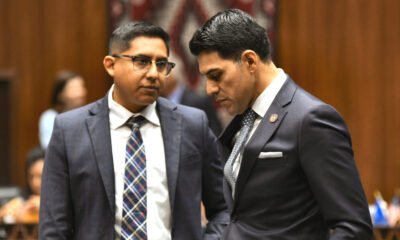Arizona house
Arizona’s Budget Showdown: Will Hobbs Face a Historic Government Shutdown?

House Republicans in Arizona are pursuing a $17 billion budget plan, setting the stage for a potential government shutdown as tensions rise between the legislature and Governor Katie Hobbs.
On June 24, the House Appropriations Committee voted along party lines to approve the pared-down spending proposal. This figure represents a reduction from both the nearly $17.6 billion budget negotiated by Hobbs with the Senate and the previous $17.3 billion plan backed by House Republicans.
Despite these developments, Hobbs has indicated her staunch opposition and plans to veto the continuation budget.
With a budget deadline of June 30 looming, the absence of an approved budget means the state will lack authority to spend beyond that date. “She’s vetoing the continuation bill,” stated press aide Christian Slater.
Divisions among House Republicans have emerged as negotiations continue among the House, Senate, and the governor. Led by Representative Livingston, some GOP lawmakers are firm that they won’t accept any spending beyond $17 billion.
During the hearings, House Speaker Steve Montenegro notably interrupted Livingston to curtail his comments on higher spending, indicating growing discontent within the party.
Montenegro asserted after the caucus that he doesn’t foresee a government shutdown. However, Livingston suggested the urgency of reaching an agreement, stating the risks of an extended shutdown and its implications on K-12 funding.
The House’s decision to approve a reduced budget plan drew criticism, particularly from those who argued it would incur long-term costs. Nick Ponder, representing Arizona’s community colleges, highlighted that the plan excludes $12 million intended for schools, including critical funding for adult education programs.
“There are about 800,000 individuals in Arizona lacking a high school diploma. Two-thirds of them receive state assistance,” Ponder explained. He emphasized potential savings if more individuals complete education programs and exit state support.
In addition, the budget omits crucial funds for state trooper salary increases, a point raised by Jeff Hawkins, president of the Arizona State Troopers Association. He noted that neighboring agencies are offering significant raises to retain experienced personnel.
Furthermore, budget constraints pose risks to basic infrastructure funding, as highlighted by Hawkins, who warned of operational failures in outdated Department of Public Safety facilities.
While resisting attempts to amend the bill, Livingston did propose the possibility of a special session to address increased spending once there’s clarity on operations post-July 1. This reflects a willingness to negotiate future priorities, albeit under strict conditions that eliminate individual projects.


















